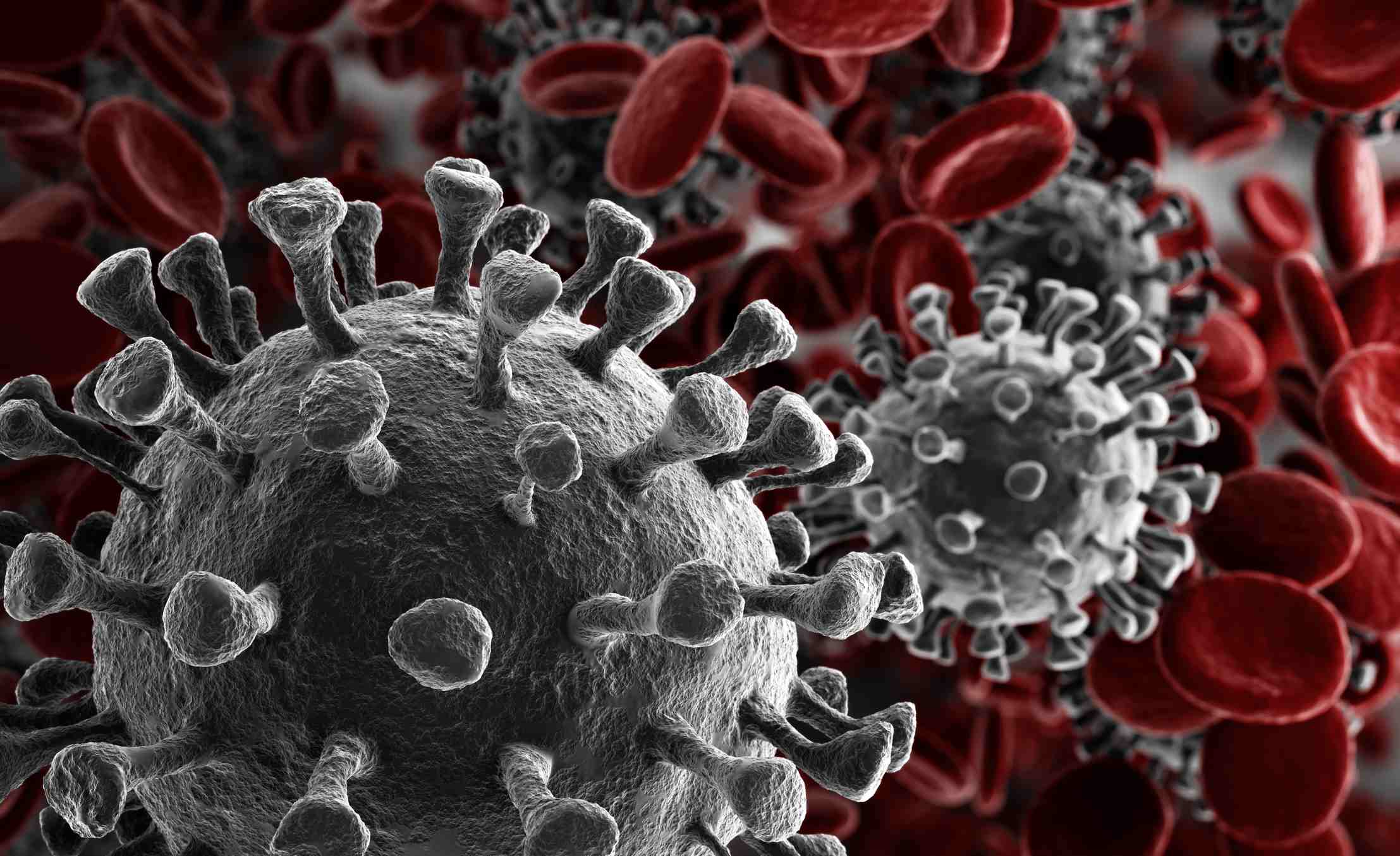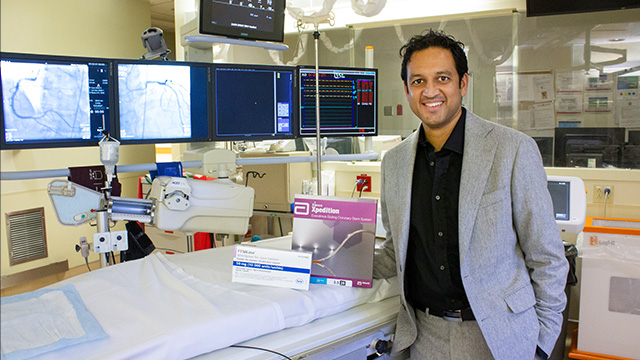This is a roundup of relevant news and media stories involving the Faculty of Medicine & Dentistry. We appreciate you relaying information that is relevant to faculty members in your respective areas.
TOP STORIES

The University of Alberta's Li Ka Shing Institute of Virology says a drug once used in an Ebola outbreak could fight the novel coronavirus. Although there are regulatory hurdles related to getting samples of the coronavirus into the country, lab work has already begun, said Lorne Tyrrell, the institute's director. Coverage also appears in Postmedia papers including the Calgary Herald, on CBC News, CityNews, CTV News, Alberta Primetime, Newstalk 770 and 630 CHED and other Corus-owned radio stations across Canada. A similar story ran on Global News (multiple stations) with comments from Matthias Götte.
Windsor Star: Clot-busting drugs help combat heart attacks: new study

U of A cardiologist Kevin Bainey conducted a study looking at the use of clot-clearing drugs in addition to balloons to treat heart attacks. Story runs in 41 Postmedia newspapers and CBC Edmonton and CTV Edmonton news.
The New York Times (via Reuters): Sleep Difficulties Are Perfectly Normal for Babies, Study Confirms

New parents who struggle to get babies to sleep through the night may not be doing anything wrong, according to new research suggesting that many apparent sleep problems are really part of normal infant development. Joanna MacLean, a sleep specialist at the U of A who wasn't involved in the study, gives expert comment. The Reuters story appears in several other media sites around the world, including the National Post and Calgary Herald.
RESEARCH
The Star: David Suzuki and wife Tara Cullis take to the stage in theatrical debut
Story about David Suzuki's theatrical debut, "What You Won't Do for Love," mentions a U of A study showing that the wildfires that burned through Fort McMurray in 2016 took a lasting psychological toll on many residents. The Canadian Press-written story appears in several newspapers and media websites across Canada.
The Star: If you feel you can't breathe, don't expect virtual assistants to call for help
Story features a study co-authored by Matthew Douma, an assistant adjunct professor of critical care medicine at the U of A, showing that when the four leading virtual digital assistants were queried aloud about first aid for a range of health situations, the answers were often off the mark. Coverage also appears in The Gateway, TechSpot, Fudzilla, Research2Reality and Softpedia News.
CTV Edmonton: Diabetes in pregnancy can lead to harmful outcomes: U of A study
Cardiology professor Padma Kaul led a study finding pregnant women with diabetes who have elevated fasting blood sugar are more than three times more likely to have a big baby and other complications during childbirth.
CBC News Edmonton: Edmonton companies vying for NASA's attention to launch their technology to space
Two Edmonton companies, ez enRoute and Tevosol, competed at a NASA event in Florida for a chance to send their technology to space. Jayan Nagendran, Tevosol's co-founder and surgical director of the Lung Transplant Program at the U of A, comments on his company's entry.
Healio: Timing of warfarin dose has no significant impact on drug's anticoagulant effect
The time of day that patients take warfarin has no statistically significant or clinically important impact on the stability of the medication's anticoagulant effect, according to results from a randomized clinical trial published in Annals of Family Medicine. The study was led by Scott Garrison, an associate professor of family medicine at the U of A.
630 CHED: Edmonton's own virtual hospital
Narmin Kassam, a professor of medicine at the U of A, is interviewed about a project to provide virtual hospital services at home for patients with complex medical issues.
AFP Fact Check: 'Thyroid guards' are not recommended during mammograms
Story mentions a 2014 study led by Christina Korownyk, an associate professor of family medicine at the U of A, that showed about half of recommendations made on medical TV shows have either no evidence or are contradicted by the best available evidence.
Global News: Household cleaner use linked to asthma risk in children: study
Young children who grow up in households where their parents frequently use cleaning products are more likely to develop asthma by the age of three years old, a new study has found. Piush Mandhane, a pediatric respirologist and associate professor of pediatrics at the U of A, is interviewed. Several other articles mentioning that the U of A contributed to the study can be found in local outlets across Alberta.
Gastroenterologist Leo Dieleman comments on a nationwide project his research team is involved in, looking at how gut bacteria, diet and mental health may help predict when diseases such as Crohn's or colitis will flare up, and which treatments may work best for individual patients. The story appears in several Global newscasts across Canada and on multiple Corus-owned radio stations.
Research2Reality: What's the right mix to keep preemies alive?
Georg Schmölzer, an associate professor of pediatrics at the U of A, comments on a CIHR-funded study he will be leading to determine how much oxygen preterm babies need to be resuscitated and how much is safe to use.
KSBI: Research may explain why we often gain weight in winter
Segment mentions a 2017 study from the U of A that shows fat cells under the skin shrink when exposed to blue light from the sun and grow during periods of less sun exposure, such as the winter months.
MD Alert: Elder-friendly emergency surgery care can improve outcomes
A recent study led by Rachel Khadaroo, an associate professor of surgery at the U of A, found that adopting an elder-friendly approach in an emergency general surgical setting led to a reduction in complications and deaths.
Science Business: Canada and UK pick winners in joint $13.6M AI research competition
Ten winners have been announced for the Canada-UK Artificial Intelligence Initiative, a $13.6-million program jointly funded by three Canadian federal research agencies and the UK national R&D agency. The U of A is part of three of the projects.
EXPERTS
Louis Hugo Francescutti, a professor with the U of A's School of Public Health and Department of Emergency Medicine, said the regular influenza that is going around right now is more likely to kill you than the novel coronavirus. He adds that the scale of what's going on in China is not likely to happen in Alberta, but if it does, the province is ready.
Stan Houston, an infectious disease specialist at the U of A, commented that the parasite is seemingly becoming more common in Alberta. Fifteen human cases of the parasite have been confirmed in the province since 2013. Coverage is also found in The Chronicle (Australia), New Zealand Herald and Today.
Huffington Post: Counting calories is basically pointless. So why are we still doing it?
Obesity expert Arya Sharma suggests that, from a health perspective, it is better to focus efforts to improve the quality of the diet, such as avoiding ultra-processed foods and eating adequate amounts of produce.
Global News Edmonton: Diabetes DIY: why thousands of people are hacking their insulin pumps
Thousands of people around the world with Type 1 diabetes are trying to better control their insulin levels by hacking into their medical equipment with instructions they found online, despite the risk. "Looping" allows the continuous glucose monitor to tell the pump how much insulin the person needs, then the pump automatically administers that dose. A malfunction could lead to a diabetic coma, even death, but U of A endocrinologist Peter Senior said that's a risk people with Type 1 diabetes are willing to take. "If you stop taking it, you could die, and if you take too much, you could die, and you have to live your life trying to balance on this tightrope."
Yahoo News: Excessive screen usage in kids: The dangers and tips to restrict tech use
A U of A study investigating the impact that screen time had found out that children spent an average of 1.5 hours in front of a screen when they were three years old, while the recommended screen time for children that age is one hour, as per the Canadian Pediatric Society.
Global News: Hunting a virus: How doctors trace an outbreak
An explanation of how doctors track disease outbreaks includes comments from U of A infectious disease expert Nelson Lee.
News Talk 650: John Gormley: Winter Vitamin D
Gerry Schwalfenberg, an assistant clinical professor of family medicine at the U of A, speaks on the importance of vitamin D in the wintertime. The interview is broadcast on multiple radio stations across Canada on the nationally syndicated John Gormley Show.
U of A infectious disease expert Nelson Lee said the unprecedented mass quarantines in China are clearly leading to "a lot of social disruption … as well as a huge impact on the economy." Article also appears on Mingshengbao.
Australian Journal of Pharmacy: Arguing the case
Leading researchers, including U of A professor of pharmacology Ross Tsuyuki, argue for why pharmacist prescribing should be autonomous and criticize language surrounding emergency provisions during the Australian bush fires.
CBC - The Dose: Should I worry if my BMI is too high?
In the first episode of a new CBC podcast, U of A obesity expert Arya Sharma discusses body fat and why BMI isn't necessarily the best indicator of health or fitness. Coverage also appears on the CBC Radio website.
O Magazine: How safe are breast implants?
Jan Willem Cohen Tervaert, a professor of medicine at the U of A, provides expert comment on the topic of breast implants and how in some women they may act as a trigger for autoimmune disease.
PEOPLE, PARTNERSHIPS AND EDUCATION
CityNews Edmonton: Alberta carpenter regains vision thanks to experimental drug
An Alberta carpenter who lost his vision years ago can once again read the numbers on his measuring tape thanks to an experimental therapy. The man is a longtime patient of Ian MacDonald, a professor of ophthalmology at the U of A. MacDonald comments on the therapy and his patient's improvement. Coverage also appears on CBC News Edmonton and Global News Edmonton.
CityNews Edmonton: Medical school student's journey to recovery
Third-year medical student Alicia Lakey is the 10th person in the world and first Canadian to undergo a revolutionary amputation surgery that preserves the nerves and muscle of the lower leg with the hope she will one day be able to use a robotic limb with sensors that can pick up the movements of the muscles and control a robotic ankle. A followup story details Lakey's efforts to help others in South America who find themselves in similar circumstances.
Calgary Herald: Alberta universities prep students for medical aid in dying
Amid a shortage of physicians in Alberta willing to carry out the province's medical assistance in dying program, Alberta medical schools are teaching curriculum meant to prepare future doctors to help grievously ill patients die with dignity. Tracey Hillier, associate dean of Undergraduate Medical Education, is interviewed. Coverage also appears on CBC News Edmonton.